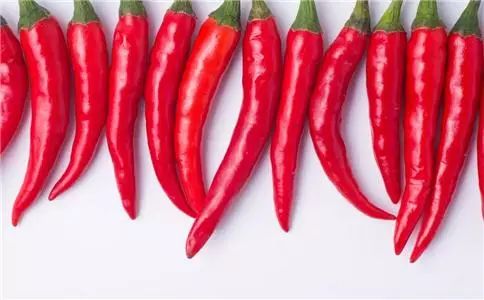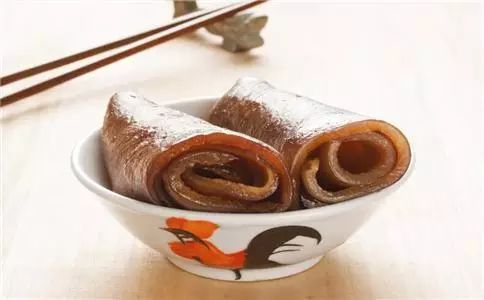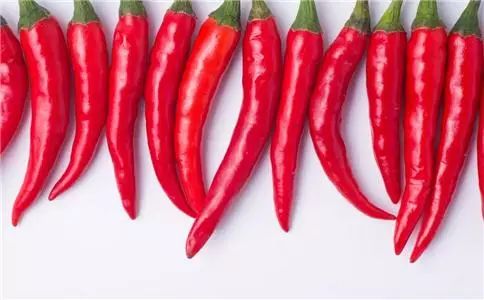
Individuals with a Yin deficiency (Yin xu) should avoid spicy foods.
Spicy flavors often stimulate the body’s heat and are considered yang (热性) foods. So, who is suitable for spicy foods? In daily life, many individuals with Yin deficiency enjoy spicy foods, believing it helps replenish their body heat. However, this is a misconception. Experts advise that those with Yin deficiency should limit their intake of yang foods as they can harm the Yin. Spicy foods such as chili peppers, scallions, ginger, garlic, pepper, and mustard are all yang in nature. Moreover, spicy foods often have a dispersing effect, which is also detrimental to Yin. Therefore, individuals with Yin deficiency should minimize their consumption of spicy foods.
How can individuals with Yin deficiency enjoy spicy foods safely?
However, with millions of Chinese people loving spicy food, what can be done? We can consider some methods to mitigate the harm of spicy, dispersing foods to Yin.
1. Eat cooked, not raw.
Spicy foods that are cooked, especially when heated, lose some of their spiciness. Therefore, individuals with Yin deficiency who enjoy spicy foods should consume them cooked rather than raw.
2. Eat fresh, not dried.
Dried chili peppers, chili powder, pepper, and mustard are considered yang foods in Traditional Chinese Medicine (TCM), and ordinary cooking methods do not alter their properties. Thus, individuals with Yin deficiency should eat less of these. Fresh chili peppers, scallions, ginger, and garlic, when cooked, have reduced spiciness or none at all, and even a small amount eaten raw has minimal impact, so it is better to consume fresh rather than dried.
Garlic comes in white and purple varieties, with purple garlic being spicier and mainly used for seasoning rather than eating. Individuals with Yin deficiency can use white garlic for seasoning.
What foods are beneficial for individuals with Yin deficiency?
1. Eggs
They not only nourish Qi and blood but also have the effect of nourishing Yin and moistening dryness, whether the egg white or yolk. Eggs are considered excellent protein sources in the medical community, containing complete proteins such as ovalbumin, ovoglobulin, and phosphoprotein. They are particularly suitable for individuals with Yin deficiency, especially when consumed with soybeans, as is common in folk practices where eggs are eaten with soy milk for added benefits.
2. Milk
It has the effects of nourishing Yin, generating fluids, and moistening dryness. Throughout history, many physicians have praised milk for its Yin nourishing properties, stating that it moistens the skin, quenches thirst, nourishes the five organs, and replenishes fluids. Individuals with a Yin deficiency constitution should consume it regularly for significant benefits.

3. Pork skin
Pork has the effect of nourishing Yin and moistening dryness. The Qing dynasty physician Wang Mengying stated: “Pork nourishes kidney fluids, replenishes stomach juices, nourishes liver Yin, and moistens the skin, stopping thirst.” According to the Ben Cao Bei Yao: “Pork has a rich flavor, moistens the intestines and stomach, generates essence, and beautifies the skin.” Therefore, it is suitable for individuals with Yin deficiency, with pork skin being even more effective.
4. Duck meat
It can nourish Yin and support the stomach. The Ben Cao Hui states: “Nourishes Yin and eliminates steaming heat.” The Sui Xi Ju Yin Shi Pu mentions: “Nourishes the Yin of the five organs, clears the heat of Yin deficiency, and nourishes the stomach and generates fluids.” Folk wisdom also considers duck to be the ideal nourishing food, suitable for those with Yin deficiency.
5. Soft-shelled turtle
It has the effect of nourishing Yin and cooling the blood, making it an excellent tonic for Yin deficiency individuals. The Ben Cao Bei Yao states: “Cools the blood and nourishes Yin.” The Sui Xi Ju Yin Shi Pu believes that soft-shelled turtle nourishes the Yin of the liver and kidneys, clearing the heat of Yin deficiency. Therefore, it is particularly suitable for those with Yin deficiency and blood heat or Yin deficiency with excessive fire and wasting heat. The shell of the soft-shelled turtle, also known as turtle shell (gui jia), also has the effect of nourishing Yin and replenishing blood, making it suitable for individuals with Yin deficiency.
6. Turtle meat
It is neutral in nature, sweet and salty in flavor, and can nourish Yin and replenish blood, making it suitable for those with Yin deficiency. The Yi Lin Zuan Yao states: “Treats bone steaming and labor heat, and symptoms of Yin deficiency with blood heat.” Turtle shell products, such as turtle shell glue, also have the effect of nourishing Yin and replenishing blood, and are also suitable for individuals with Yin deficiency.
7. Dried scallops
Also known as jiang yao zhu or ma jia zhu, this seafood is neutral in nature and sweet and salty in flavor, capable of nourishing Yin and replenishing the kidneys. The Ben Cao Qiu Zhen states: “Nourishes true Yin.” The Ben Cao Cong Xin mentions: “Treats thirst.” Dried scallops are tender and delicious, being a high-protein food, thus individuals with Yin deficiency should often use dried scallops in soups for maximum benefit.
8. Sea cucumber
It has the effects of nourishing Yin, replenishing blood, benefiting essence, and moistening dryness. The Yao Xing Kao states: “Reduces fire and nourishes the kidneys.” The Shi Wu Yi Ji mentions: “Sea cucumber nourishes kidney essence and benefits the marrow.” The Qing dynasty food physician Wang Mengying believed that sea cucumber can nourish Yin, replenish blood, and moisten dryness. Sea cucumber is a high-protein, low-fat delicacy that can greatly nourish and is suitable for individuals with Yin deficiency.

